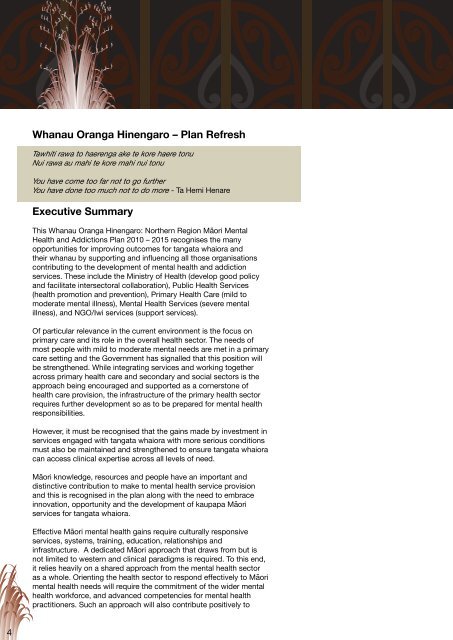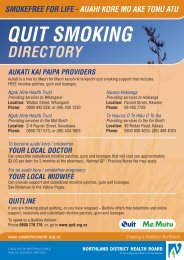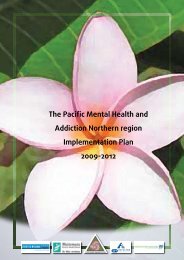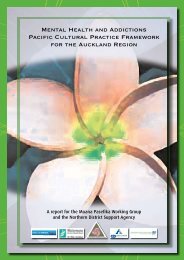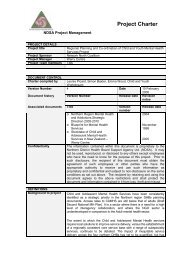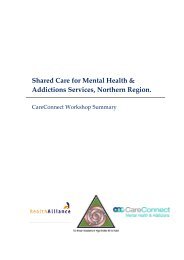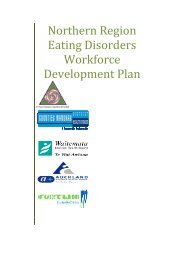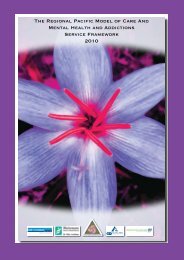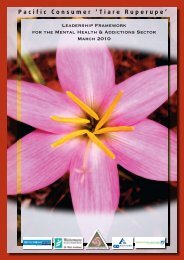Whanau Oranga Hinengaro: Northern Region Maori ... - Network North
Whanau Oranga Hinengaro: Northern Region Maori ... - Network North
Whanau Oranga Hinengaro: Northern Region Maori ... - Network North
You also want an ePaper? Increase the reach of your titles
YUMPU automatically turns print PDFs into web optimized ePapers that Google loves.
<strong>Whanau</strong> <strong>Oranga</strong> <strong>Hinengaro</strong> – Plan Refresh<br />
Tawhiti rawa to haerenga ake te kore haere tonu<br />
Nui rawa au mahi te kore mahi nui tonu<br />
You have come too far not to go further<br />
You have done too much not to do more - Ta Hemi Henare<br />
Executive Summary<br />
This <strong>Whanau</strong> <strong>Oranga</strong> <strong>Hinengaro</strong>: <strong><strong>North</strong>ern</strong> <strong>Region</strong> Māori Mental<br />
Health and Addictions Plan 2010 – 2015 recognises the many<br />
opportunities for improving outcomes for tangata whaiora and<br />
their whanau by supporting and influencing all those organisations<br />
contributing to the development of mental health and addiction<br />
services. These include the Ministry of Health (develop good policy<br />
and facilitate intersectoral collaboration), Public Health Services<br />
(health promotion and prevention), Primary Health Care (mild to<br />
moderate mental illness), Mental Health Services (severe mental<br />
illness), and NGO/Iwi services (support services).<br />
Of particular relevance in the current environment is the focus on<br />
primary care and its role in the overall health sector. The needs of<br />
most people with mild to moderate mental needs are met in a primary<br />
care setting and the Government has signalled that this position will<br />
be strengthened. While integrating services and working together<br />
across primary health care and secondary and social sectors is the<br />
approach being encouraged and supported as a cornerstone of<br />
health care provision, the infrastructure of the primary health sector<br />
requires further development so as to be prepared for mental health<br />
responsibilities.<br />
However, it must be recognised that the gains made by investment in<br />
services engaged with tangata whaiora with more serious conditions<br />
must also be maintained and strengthened to ensure tangata whaiora<br />
can access clinical expertise across all levels of need.<br />
Māori knowledge, resources and people have an important and<br />
distinctive contribution to make to mental health service provision<br />
and this is recognised in the plan along with the need to embrace<br />
innovation, opportunity and the development of kaupapa Māori<br />
services for tangata whaiora.<br />
Effective Māori mental health gains require culturally responsive<br />
services, systems, training, education, relationships and<br />
infrastructure. A dedicated Māori approach that draws from but is<br />
not limited to western and clinical paradigms is required. To this end,<br />
it relies heavily on a shared approach from the mental health sector<br />
as a whole. Orienting the health sector to respond effectively to Māori<br />
mental health needs will require the commitment of the wider mental<br />
health workforce, and advanced competencies for mental health<br />
practitioners. Such an approach will also contribute positively to<br />
4


